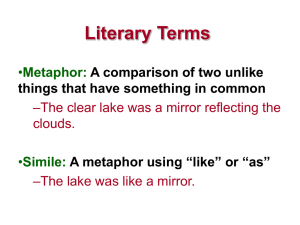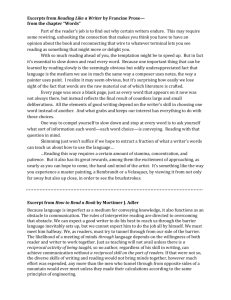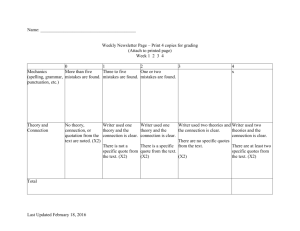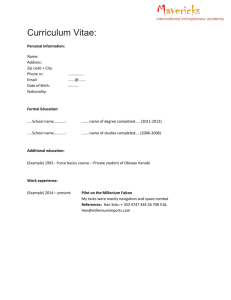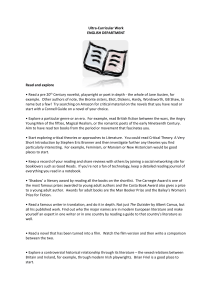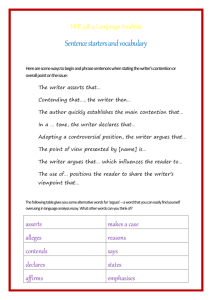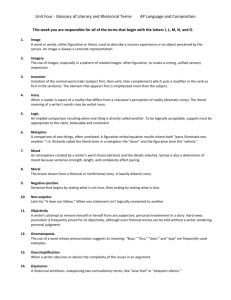downloadable - Salem State University
advertisement
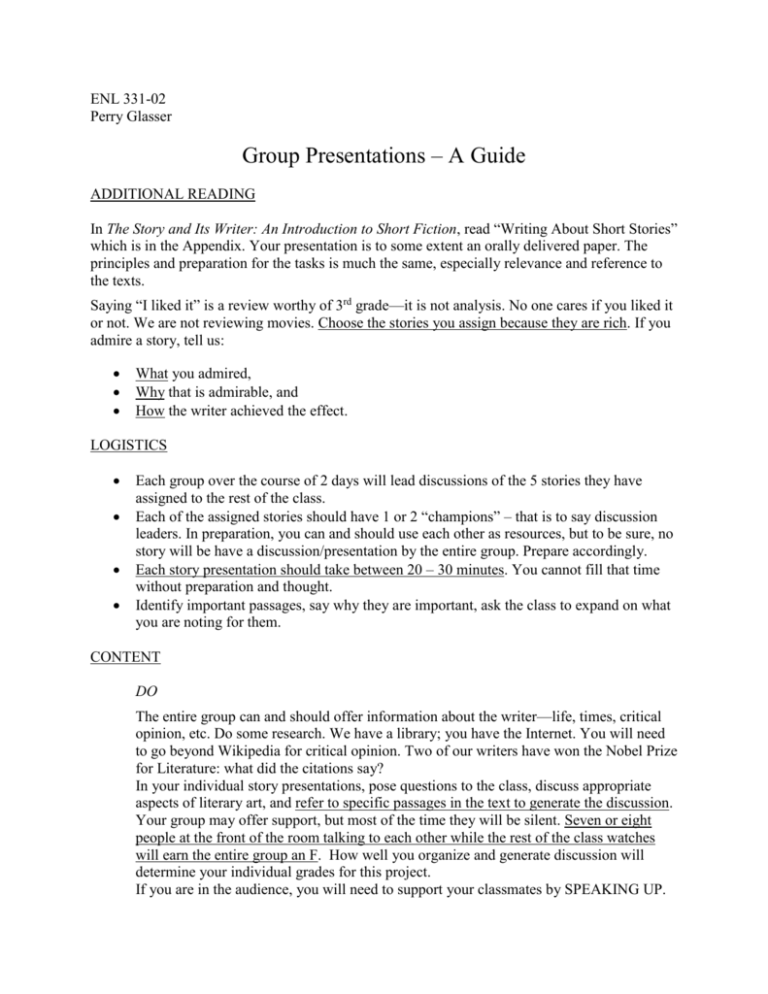
ENL 331-02 Perry Glasser Group Presentations – A Guide ADDITIONAL READING In The Story and Its Writer: An Introduction to Short Fiction, read “Writing About Short Stories” which is in the Appendix. Your presentation is to some extent an orally delivered paper. The principles and preparation for the tasks is much the same, especially relevance and reference to the texts. Saying “I liked it” is a review worthy of 3rd grade—it is not analysis. No one cares if you liked it or not. We are not reviewing movies. Choose the stories you assign because they are rich. If you admire a story, tell us: What you admired, Why that is admirable, and How the writer achieved the effect. LOGISTICS Each group over the course of 2 days will lead discussions of the 5 stories they have assigned to the rest of the class. Each of the assigned stories should have 1 or 2 “champions” – that is to say discussion leaders. In preparation, you can and should use each other as resources, but to be sure, no story will be have a discussion/presentation by the entire group. Prepare accordingly. Each story presentation should take between 20 – 30 minutes. You cannot fill that time without preparation and thought. Identify important passages, say why they are important, ask the class to expand on what you are noting for them. CONTENT DO The entire group can and should offer information about the writer—life, times, critical opinion, etc. Do some research. We have a library; you have the Internet. You will need to go beyond Wikipedia for critical opinion. Two of our writers have won the Nobel Prize for Literature: what did the citations say? In your individual story presentations, pose questions to the class, discuss appropriate aspects of literary art, and refer to specific passages in the text to generate the discussion. Your group may offer support, but most of the time they will be silent. Seven or eight people at the front of the room talking to each other while the rest of the class watches will earn the entire group an F. How well you organize and generate discussion will determine your individual grades for this project. If you are in the audience, you will need to support your classmates by SPEAKING UP. Here are some of the qualities of literary art we have discussed: Conflict: What difficulties do characters face? How are these difficulties common to us all or unique to the story? How does the conflict illuminate an idea? Theme: Is the idea behind the story about individual human qualities or are they social commentary? If the former, what insight to the human condition is the writer illuminating? If the latter, what social problem of condition is the writer illuminating and discuss why s/he would choose to do so. Character and Characterization: How do we know what we know about the people in a story? Style: Diction—how does the writer choose words to any special effect? Sentence structure—how does the writer construct ideas to any special effect? Literary Effects – Irony? Metaphor? Shifting point of view? Humor, Irony, Suspense, the efficient illumination of character and idea. Voice and Persona: Is there a central point of view in the story that is unique to a single character? What elements of literary art bring that characterization to the forefront? Scene and Narrative: What has been dramatized? What summarized? Why? DON’T “Relatability” –Junk this term. It had its uses, but it now must be abandoned. 1. It assesses the worth of a story by whether the reader sees him- or herself in the story, an act of narcissism and ego. Do we really want to say a story is less good because we do not see ourselves in it? Will that mean that stories about men can only be read sympathetically by men? The same for women, of course. Frankly, who cares if you don’t see the story’s relevance to your life? The problem may be the narrowness of your life, not the story. We read to expand our lives, not validate who we think we are. 2. Such a principle will inhibit out ability to appreciate literature because it is distant from us in time and geography: shall we say that 19th century fiction is “out of date?” Are stories set in Alaska less relevant to us than those set in Massachusetts? Art accrues; it does not progress. 3. Writers write for purposes to take us beyond ourselves. If we insist that a story must be “relateable,” we insist that the writer never move us from where we are. Beyond a very brief summary, NEVER TELL the class the story. We read it, thanks.

